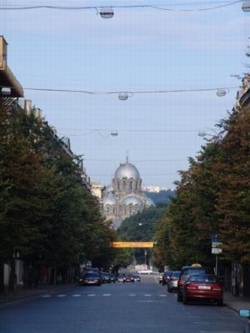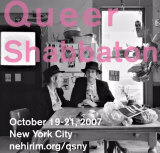 May 07
May 07
The Languages of Vilnius
Jordan Benjamin
 My great-grandfather was born in Vilnius in the late 19th century. After immigrating to America in his early 20s, he changed his last name from Milovsky to Miller, abandoned Orthodoxy, and rarely discussed his previous life.
My great-grandfather was born in Vilnius in the late 19th century. After immigrating to America in his early 20s, he changed his last name from Milovsky to Miller, abandoned Orthodoxy, and rarely discussed his previous life.
“Nobody in Milwaukee ever talked about where they came from,” my grandmother told me. “Everyone was running away from something.”
In Vilnius, history can be just as elusive. Once inhabited by over 60,000 Jewish residents, the city currently reports a Jewish population numbering less than 4,000. Plaques commemorating former Jewish Institutions – crumbling Yiddish-theaters and publishing houses, red-roofed synagogues and yeshivas – hang inconspicuously in the shadows. A three-foot memorial that marks the location of what used to be the Jewish ghetto stands obscured by traffic poles.
Like my great-grandfather, Vilnius tries to keep its history discreet. But I did not come to Lithuania to study its history. I came to learn the language my great-grandfather had left behind.
Five years ago, a group of scholars from America, Israel, and Eastern Europe founded the Vilnius Yiddish Institute. Each summer the Institute holds a month-long language intensive course at four different levels. People from across the world enroll: academics from Russia, grandparents from Argentina, musicians from Poland, antique dealers from America. I was one among seventy students to take part in the program last August. So was my friend, Raphael.
An earnest 23-year-old comparative literature student from Paris, Raphael has curly black hair, a short, thick beard, and brown eyes that dart back and forth with constant curiosity. He loves to talk to people and to take in as much of the world as possible. He voices all his observations without the slightest bit of self-consciousness. He has the gift of honest expression and a laugh that fills up rooms.
On the second day of the program, while we were sitting in a small café off the city’s main drag, Raphael described an idea he had for his master’s thesis.
“I’m really into the way certain modernist writers use the spaces between words to convey meaning. I mean – everything is tied to language. How could you understand anything without first turning it into a word?”
He paused.
“What I’m interested in, though, is in examining the way these writers described the inevitability of falling into the holes between words.”
I smiled. “I think I know that inevitability. It takes me such a long time to figure out a way to articulate what I’m feeling.”
“Exactly,” Raphael said. “Existing in a hole – waiting for a word to present itself.”
“But you said everything is tied to language. Doesn’t existing in a hole mean existing outside of language?”
“Not at all. Holes are an essential a part of language. They constitute half the text.”
It was a surreal conversation to be having over beers and Italian-style Lithuanian food, an old accordion player crooning two blocks away, the street lamps flickering off and on. I was already somewhat familiar with aspects of what Raphael was talking about. I had read an article in college about various modernist writers who endowed words with the power to reconstruct reality. Occasionally, these writers would lose their faith in words, deeming language unequipped to render their world accurately. Raphael seemed to be describing a poetic trend within this movement whereby poets would graphically represent their crisis of language through the spaces between words. Of particular interest to me, however, was the way Raphael derived a veritable life-philosophy from the movement. He came to view existence itself as a language, filled with moments in which words turn the world concrete and moments in which infinity – a reality unbounded by words – consumes both the concrete and the writer within it.
As the weeks passed, Raphael’s proclivity for abstraction worked its way deeper into me. America receded from my mind. I stopped checking email and reading the news. It rained every day. I began asking myself a series of strange, theoretical questions like, “If you believe existence is a language, then what does it mean to fall in love with a language that is dying?”
ii.
Yiddish has been called funny, sarcastic, spiteful and beautiful. Referring to the way it sounds, Raphael calls it “sensual.” But I am more interested in semantics than sound. Like German and Russian, Yiddish attaches prepositions and reflexive pronouns to its verbs. The phrase “to confide in someone,” for example, appears in Yiddish as oysredn zikh far emetsen . The verbal element of the phrase, oysredn , is comprised of two morphemes: oys, a preposition meaning “ out, ” “ outward, ” or “ out of; ” and redn , a verb meaning “to speak.” Zikh is a reflexive pronoun meaning “ oneself, ” and far emetsen is a prepositional phrase meaning “before someone.” Literally then, the phrase translates to “ to speak yourself outward before someone. ” Unlike the English expression, which hinges on the notion of trust (it derives from Latin verb fidere , meaning to trust), the Yiddish expression is more concerned with portraying the execution of an action. It locates the action’s origin (the self), describes the direction at which the action is aimed (outward), and names the verb that ultimately sets this action into motion (forming words). Although the context of trust highlighted by the English phrase is not explicit in the Yiddish, it is inherent.
 Half-way into the program, one of my professors gave a lecture on the work of the Yiddish modernist, Abraham Sutzkever. A former resident of Vilnius, Sutzkever was immersed in the city’s literary culture. He studied grammar and Old Yiddish with the famous Yiddish linguists Max Weinreich and Noah Prylucki. By his mid-20s, he had already garnered international acclaim. Critics praised him for his unconventional rhyme schemes, his creative meters, and his linguistic innovation.Yet an early photograph of the poet reveals light, weak eyes tucked beneath a furrowed brow in a humble, almost plaintive expression
Half-way into the program, one of my professors gave a lecture on the work of the Yiddish modernist, Abraham Sutzkever. A former resident of Vilnius, Sutzkever was immersed in the city’s literary culture. He studied grammar and Old Yiddish with the famous Yiddish linguists Max Weinreich and Noah Prylucki. By his mid-20s, he had already garnered international acclaim. Critics praised him for his unconventional rhyme schemes, his creative meters, and his linguistic innovation.Yet an early photograph of the poet reveals light, weak eyes tucked beneath a furrowed brow in a humble, almost plaintive expression
When Nazis invaded Vilnius in 1941, Sutzkever and his family were confined to one of the city’s two ghettoes. He watched as members of his community gradually disappeared. He watched as his child and mother were murdered. But still, for the first two years of the war, Sutzkever remained devoted to his modernist perspective, secure in his belief that words had the power to predicate reality in an inspirational way. A particularly striking example of this can be found in the poem “I Lie in a Coffin.” Here, Sutzkever fictionalizes his escape from Nazi persecution by hiding in a coffin. The text reads as follows (and the translations here and throughout are my own):
I lie in a coffin.
As if in wooden clothes
I lie.
Let this be a ship
over storming waves.
Let this be a cradle.And here,
where bodies have
split themselves from time,
I call after you, Sister,
and you hear my calling
in the distance.What happens in a coffin? A shiver?
An unexpected body?
You come.
I discern your black pupil,
your breath,
your light.And thus is a face all the order I need:
Today I am here,
tomorrow I will be with you,
now in a coffin,
as if in wooden clothes,
my word still sings.
That Sutzkever understood language to be transformative is expressly evident in his attempt to use words to turn coffins into cradles and despair into the face of a sister. Although Sutzkever accomplishes this transfiguration of reality through composing a lyric of ninety words, to him the poem represents a single word. It is a word that he continues to let “sing.” It is a word that promises him a future.
In contrast to most of his other work, Sutzkever wrote “I Lie in a Coffin” without meter. He occasionally rhymes end-words, but the rhymes are too disjointed to resonate. His language is stripped but sharp. Etymologically, all the words derive from a Germanic or Slavic root except “ coffin ” (orn ), “ face ” (punim ), and “ order ” (seder ). These Sutzkever draws from Biblical Hebrew.
It is difficult to assess how exactly Sutzkever intended his Hebrew words to sound in the context of “I Lie in a Coffin.” While the words themselves would not have been uncommon to an early 20th century Yiddish-speaking audience, they are jarring to the modern reader, plying an already inspirational poem with an additionally inspirational sense of Jewish historical continuity: These words are ancient; they have been passed down to us over the millennia; we continue to use them in our lives and our art. Whether intentionally or not, Sutzkever implemented these words in an effort to understand the chaos of his present. He may have taken their history for granted. To a non-native Yiddish speaker, however, Hebrew words are impossible to gloss over.
As conditions in the ghetto worsened, Sutzkever’s relation to language changed. It was not that he had grown disenchanted by the notion of transforming reality through words. He had simply lost the ability to form words, caught in the spaces between them. In 1943, for example, he writes:
Under Your white and gleaming stars,
stretch Your white hand to me.
All my words have turned to tears,
longing to rest in your hand.See, their shine grows ever dark
in my basement-eyes,
and how I have no borders left
to turn my words to sky.But still I will, O trusted God,
offer what remains of me to You,
for fire burns my every place
and all my days, in fire too.In basements only, in boundless holes,
does the murderous silence weep.
Yet I try to rise higher, above the fire,
and search: Where are you, speak?Names pursue me strangely, resolutely:
Stairs and courtyards, names of escape.
And yet I hang – a broken string –
and brokenly strum myself so faint:Under Your white and gleaming stars
stretch Your white hand to me.
All my words have to tears,
longing to rest in Your hand.










